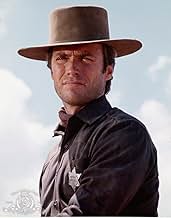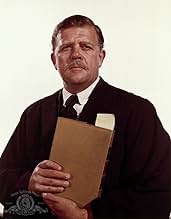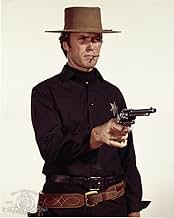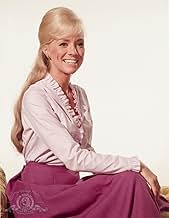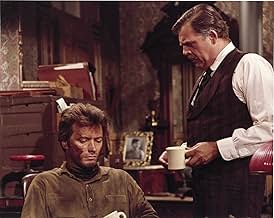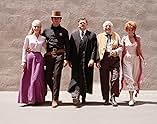IMDb-BEWERTUNG
7,0/10
46.782
IHRE BEWERTUNG
Wenn ein unschuldiger Mann einen Lynchmord nur knapp überlebt, kehrt er als Gesetzeshüter zurück, der entschlossen ist, die Vigilanten vor Gericht zu bringen.Wenn ein unschuldiger Mann einen Lynchmord nur knapp überlebt, kehrt er als Gesetzeshüter zurück, der entschlossen ist, die Vigilanten vor Gericht zu bringen.Wenn ein unschuldiger Mann einen Lynchmord nur knapp überlebt, kehrt er als Gesetzeshüter zurück, der entschlossen ist, die Vigilanten vor Gericht zu bringen.
Empfohlene Bewertungen
Clint Eastwood's most underrated film, Hang 'Em High is a throughly enjoyable movie. It has the feel of a John Wayne western, as opposed to the spaghetti western formula in which Eastwood with Sergio Leone combined so magnificently with each other in the Dollars trilogy.
Eastwood gives a very worthy performance as Marshall Jed Cooper. The central dilemma of having to operate within the law in conflict with his own personal view of justice is executed very well by Eastwood. On the whole, Eastwood's performance is certainly a strong point of the film and a great performance in its own right.
The storyline itself is relatively well structured with interesting elements relating to the law and the justice system. However, a rather pointless, rushed and half baked romantic subplot by Inger Stevens (who is sadly woefully out of her acting league alongside Eastwood) adds nothing to the story and becomes rather annoying on repeat viewings.
However, special mention must go to both Pat Hingle and Ed Begley who both give some excellent performances, perhaps even superior to Eastwood himself.
Hang 'Em High is a great Eastwood western, provided you don't expect something magical like The Good, The Bad And The Ugly or Unforgiven. Entertaining and more complex than you would expect but sadly, greatly underestimated. Every Eastwood fan should at least give it a chance.
Overall I give it a solid and well deserved 8/10. Be sure to get a copy of this hidden gem.
Eastwood gives a very worthy performance as Marshall Jed Cooper. The central dilemma of having to operate within the law in conflict with his own personal view of justice is executed very well by Eastwood. On the whole, Eastwood's performance is certainly a strong point of the film and a great performance in its own right.
The storyline itself is relatively well structured with interesting elements relating to the law and the justice system. However, a rather pointless, rushed and half baked romantic subplot by Inger Stevens (who is sadly woefully out of her acting league alongside Eastwood) adds nothing to the story and becomes rather annoying on repeat viewings.
However, special mention must go to both Pat Hingle and Ed Begley who both give some excellent performances, perhaps even superior to Eastwood himself.
Hang 'Em High is a great Eastwood western, provided you don't expect something magical like The Good, The Bad And The Ugly or Unforgiven. Entertaining and more complex than you would expect but sadly, greatly underestimated. Every Eastwood fan should at least give it a chance.
Overall I give it a solid and well deserved 8/10. Be sure to get a copy of this hidden gem.
This was Clint Eastwood's American Western debut that I had never really seen all the way through until now. At first I thought it would be another ride 'em high, cowboys n' indians flick that was popular in America those days... before Sergio Leone shook the genre down to its raw and merciless possibilities.
The film was pretty good, and the moral undercurrent of justice "by a dirty rope on the plain, or a judge in a robe standing before the American flag" is rather striking. The Federal judge is by far one of the most interesting characters I have seen yet in a Western.
Indeed, the grittiest and most barbaric scene is not the lynching of an innocent man, but the public hanging on the eve of statehood... to prove that Oklahoma Territory executed the sort of justice required of a "civilized" state of the Union. It is made a public spectacle with beautiful hymns and cold beer. And just the way each of the condemned faces his execution is tongue in cheek.
Then there was the campfire scene where Captain Wilson confers with his employees regarding their options: irony, fear and desperation. They put a human face on their culpability, similiarly echoed decades later by Little Bill's "I don't deserve this, I was building house." And the few who chose not to run chose a desperate and violent option.
A dillemic "no one wins" justice spiralling into graphic violence... and ultimately an undiginified and graceless death. What was perfected into poignant brevity by Unforgiven was born in Hang Em High's exploration of two men's differing approaches to an unforgiving justice... a justice that led either to the end of a noose, or the end of a gun.
Not bad at all...
The film was pretty good, and the moral undercurrent of justice "by a dirty rope on the plain, or a judge in a robe standing before the American flag" is rather striking. The Federal judge is by far one of the most interesting characters I have seen yet in a Western.
Indeed, the grittiest and most barbaric scene is not the lynching of an innocent man, but the public hanging on the eve of statehood... to prove that Oklahoma Territory executed the sort of justice required of a "civilized" state of the Union. It is made a public spectacle with beautiful hymns and cold beer. And just the way each of the condemned faces his execution is tongue in cheek.
Then there was the campfire scene where Captain Wilson confers with his employees regarding their options: irony, fear and desperation. They put a human face on their culpability, similiarly echoed decades later by Little Bill's "I don't deserve this, I was building house." And the few who chose not to run chose a desperate and violent option.
A dillemic "no one wins" justice spiralling into graphic violence... and ultimately an undiginified and graceless death. What was perfected into poignant brevity by Unforgiven was born in Hang Em High's exploration of two men's differing approaches to an unforgiving justice... a justice that led either to the end of a noose, or the end of a gun.
Not bad at all...
"Hang 'Em High" is a fictionalized account of Hangin' Judge Parker's court at Fort Smith, Arkansas. Judge Parker had jurisdiction over a large chunk of Indian Territory (Oklahoma today). The house of ill repute in the film is a fictionalized version of Miss Laura's Social Club which still stands in Fort Smith and has the dubious distinction of being the only whore house on the National Register of Historic Places. In the movie, Fort Smith becomes Fort Grant but a few of the place names used are actual names of towns nearby, such as Alma, Arkansas, and Poteau, Oklahoma. The river in "Hang 'Em High" is too small (even before the locks and dams) to be the Arkansas River but could stand in for the Poteau River; the confluence of the two rivers occurs at Belle Point in Fort Smith. Most of the movie was shot in California and New Mexico (certainly not eastern Oklahoma) but the scenes of the gallows and the judge's court and office look very much like Judge Parker's Court in Fort Smith that is also on the National Register of Historic Places. If not actually filmed there, then the producer and director did an excellent job recreating it as a set. Even the dungeon jail is correct.
This was Clint Eastwood's first American western following his triumph in Sergio Leone's spaghetti western trilogy. Eastwood wanted Leone to direct this one but he was already committed to another project. From what I read neither Eastwood nor director Ted Post worked well with the producer/writer Leonard Freeman.
"Hang 'Em High" starts out with a bang, a lynching that backfires. To show the audience that Jed Cooper (Clint Eastwood) is a good guy, Cooper rescues a calf from drowning. This ploy was later used in "Tombstone" when Wyatt Earp (Kurt Russell), on his first appearance on screen, aids a horse that is being mistreated. Wyatt gives the perpetrator a taste of his own medicine reprimanding him, "Hurts, don't it?" Veteran actor Ben Johnson, who was from Oklahoma, happens on the scene while Cooper is still dangling, cuts him free, then throws him into the "tumbleweed wagon" full of thieves and cut throats bound for Fort Grant and justice. After lingering in the dungeon jail awhile, the judge clears Cooper and makes him a federal Marshall, warning him to bring the nine men in who attempted to hang him, but bring them in alive. The rest of the film deals with Cooper rounding up the nine plus a few other killers along the way. There is also emphasis on the different interpretation of justice by Cooper, a former lawman, and the judge. This leads to several dramatic confrontations. There is a parallel story of a search for justice by Rachel Warren (Inger Stevens)who falls for Cooper and visa versa. They have a thirst for vengeance in common.
Much of the movie is fiction, but parts are based on history. The circus atmosphere that accompanied the public hangings in Fort Smith during Judge Parker's rule is shown basically as it has been reported. There were vendors present, hawking all types of goods and goodies. Children wandered around with or without their parents. The fathers would sometimes place their children on their shoulders so the tads could get a better view of the executions. And there were multiple hangings recorded, similar to the one in the film.
The viewer may enjoy seeing a lot of familiar faces in the cast. Veteran actor Bob Steele plays Old Man Jenkins, a member of the lynching party. Bruce Dern is as ornery as they come. He is not only a member of the lynching party but a cold-blooded killer as well. Alan Hale, Jr. (The Skipper to his Little Buddy), one of the lynching party, is a blacksmith who seems apathetic to the incident. Dennis Hopper has what could be labeled a billed cameo role. The viewer barely sees his face at all. L.Q. Jones is a member of the lynching party turning in his usual fine performance. Charles McGraw plays the sheriff of Red Creek (possibly Garrison Creek, which today is Roland, Oklahoma) who has a back problem--or is it a spine problem? James MacArthur makes a solemn preacher extracting final confessions from the condemned.
Pat Hingle portrays the hanging judge in fairly realistic terms. The real hanging judge never watched the condemned swing. Judge Adam Fenton not only watches but nods to the hangmen when to pull the lever. The masterful Ed Begley is the vicious leader of the lynching party who is determined to make amends for his botched hanging of Cooper by hanging him even higher next time. The lovely and sexy Inger Stevens turns in a winning performance as a supplement to Cooper's vengeance. And Clint Eastwood, well, he's Clint Eastwood. Need I say more?
This was Clint Eastwood's first American western following his triumph in Sergio Leone's spaghetti western trilogy. Eastwood wanted Leone to direct this one but he was already committed to another project. From what I read neither Eastwood nor director Ted Post worked well with the producer/writer Leonard Freeman.
"Hang 'Em High" starts out with a bang, a lynching that backfires. To show the audience that Jed Cooper (Clint Eastwood) is a good guy, Cooper rescues a calf from drowning. This ploy was later used in "Tombstone" when Wyatt Earp (Kurt Russell), on his first appearance on screen, aids a horse that is being mistreated. Wyatt gives the perpetrator a taste of his own medicine reprimanding him, "Hurts, don't it?" Veteran actor Ben Johnson, who was from Oklahoma, happens on the scene while Cooper is still dangling, cuts him free, then throws him into the "tumbleweed wagon" full of thieves and cut throats bound for Fort Grant and justice. After lingering in the dungeon jail awhile, the judge clears Cooper and makes him a federal Marshall, warning him to bring the nine men in who attempted to hang him, but bring them in alive. The rest of the film deals with Cooper rounding up the nine plus a few other killers along the way. There is also emphasis on the different interpretation of justice by Cooper, a former lawman, and the judge. This leads to several dramatic confrontations. There is a parallel story of a search for justice by Rachel Warren (Inger Stevens)who falls for Cooper and visa versa. They have a thirst for vengeance in common.
Much of the movie is fiction, but parts are based on history. The circus atmosphere that accompanied the public hangings in Fort Smith during Judge Parker's rule is shown basically as it has been reported. There were vendors present, hawking all types of goods and goodies. Children wandered around with or without their parents. The fathers would sometimes place their children on their shoulders so the tads could get a better view of the executions. And there were multiple hangings recorded, similar to the one in the film.
The viewer may enjoy seeing a lot of familiar faces in the cast. Veteran actor Bob Steele plays Old Man Jenkins, a member of the lynching party. Bruce Dern is as ornery as they come. He is not only a member of the lynching party but a cold-blooded killer as well. Alan Hale, Jr. (The Skipper to his Little Buddy), one of the lynching party, is a blacksmith who seems apathetic to the incident. Dennis Hopper has what could be labeled a billed cameo role. The viewer barely sees his face at all. L.Q. Jones is a member of the lynching party turning in his usual fine performance. Charles McGraw plays the sheriff of Red Creek (possibly Garrison Creek, which today is Roland, Oklahoma) who has a back problem--or is it a spine problem? James MacArthur makes a solemn preacher extracting final confessions from the condemned.
Pat Hingle portrays the hanging judge in fairly realistic terms. The real hanging judge never watched the condemned swing. Judge Adam Fenton not only watches but nods to the hangmen when to pull the lever. The masterful Ed Begley is the vicious leader of the lynching party who is determined to make amends for his botched hanging of Cooper by hanging him even higher next time. The lovely and sexy Inger Stevens turns in a winning performance as a supplement to Cooper's vengeance. And Clint Eastwood, well, he's Clint Eastwood. Need I say more?
Ex-lawman turned cattle rancher Jed Cooper is taken newly purchased cattle back home when he is caught by a posse who accuse him of murder and lynch him. They ride off to leave him to die, however he is cut down by a group of marshals who add him to their prisoners and take him to the judge. Having had his story cleared Cooper is offered a job as a marshal and agrees to do it. However when his first task is to arrest the men who hung him can he take the stand away from revenge and on the side of the law.
I watched this cause I do like a good western every now and again. The actual plot is quite simple on the surface man out for revenge, but it uses it quite well. It makes some interesting parallels between the hanging of men by the lynch parties and the hanging of men by a judge. It doesn't fully make it's point but it is good to have something to think about in a western. Outside of this the film has some good drama even if the end feels more like the conclusion of an episode in a TV series rather than the finale of a film.
Of course the reason for this may be Post's involvement as director. He used to direct Rawhide with Eastwood and was picked for this film to support Eastwood. This was his first American film after doing all those spaghetti westerns and I assume he wanted a familiar hand on the tiller. He does well here as he always did with his western characters, I read that he also directed some of it. The rest of the cast are made up of a few famous names (Bruce Dern, LQ Jones for example) but regardless everyone does well in their roles.
It's not a classic western but it rises above the average by having a good lead in the shape of Eastwood and some plot strands that go beyond the revenge storyline and encourage you to think of deeper issues.
I watched this cause I do like a good western every now and again. The actual plot is quite simple on the surface man out for revenge, but it uses it quite well. It makes some interesting parallels between the hanging of men by the lynch parties and the hanging of men by a judge. It doesn't fully make it's point but it is good to have something to think about in a western. Outside of this the film has some good drama even if the end feels more like the conclusion of an episode in a TV series rather than the finale of a film.
Of course the reason for this may be Post's involvement as director. He used to direct Rawhide with Eastwood and was picked for this film to support Eastwood. This was his first American film after doing all those spaghetti westerns and I assume he wanted a familiar hand on the tiller. He does well here as he always did with his western characters, I read that he also directed some of it. The rest of the cast are made up of a few famous names (Bruce Dern, LQ Jones for example) but regardless everyone does well in their roles.
It's not a classic western but it rises above the average by having a good lead in the shape of Eastwood and some plot strands that go beyond the revenge storyline and encourage you to think of deeper issues.
Hang 'Em High marks Clint Eastwood's return to the American cinema, taking his character from those Sergio Leone films back to the good old USA. And even giving the man with no name, a name.
In this case he's Jed Cooper who has bought some cattle from some rustlers unknowingly and is accused of rustling and murder by a self constituted posse headed by vengeful Ed Begley. The dozen in the posse hang him.
Up to now this sounds like The Oxbow Incident. But unlike what happened to Dana Andrews, Anthony Quinn, and Francis Ford a very old and fraying rope was used. Eastwood's neck doesn't snap and the group don't wait until he chokes to death. He survives and becomes a man with a mission.
The nicest part for Eastwood is he gets to do his mission with the imprimatur of the law. The best performance in the film comes from Pat Hingle who's a no-nonsense hanging federal judge in the territory. He intends to see that laws are enforced and justice is swift.
Besides Hingle and Bailey, director Ted Post gives Eastwood a good cast of film and TV regulars in support. The tragic Inger Stevens is his leading lady here, a woman who's got a vengeance quest of her own going and who really does understand what makes Clint tick. This was one of her last films, she was a troubled and tragic woman in life. A very sad loss.
Clint's legion of fans will love this one.
In this case he's Jed Cooper who has bought some cattle from some rustlers unknowingly and is accused of rustling and murder by a self constituted posse headed by vengeful Ed Begley. The dozen in the posse hang him.
Up to now this sounds like The Oxbow Incident. But unlike what happened to Dana Andrews, Anthony Quinn, and Francis Ford a very old and fraying rope was used. Eastwood's neck doesn't snap and the group don't wait until he chokes to death. He survives and becomes a man with a mission.
The nicest part for Eastwood is he gets to do his mission with the imprimatur of the law. The best performance in the film comes from Pat Hingle who's a no-nonsense hanging federal judge in the territory. He intends to see that laws are enforced and justice is swift.
Besides Hingle and Bailey, director Ted Post gives Eastwood a good cast of film and TV regulars in support. The tragic Inger Stevens is his leading lady here, a woman who's got a vengeance quest of her own going and who really does understand what makes Clint tick. This was one of her last films, she was a troubled and tragic woman in life. A very sad loss.
Clint's legion of fans will love this one.
Wusstest du schon
- WissenswertesClint Eastwood (Marshal Jed Cooper) wore the same gun belt and holster that he (as "The Man with No Name") wore in the "Dollars" trilogy (the three "Spaghetti Western" movies directed by Sergio Leone), and that he also wore as Hogan in Ein Fressen für die Geier (1970).
- PatzerWhen Jed is rescued from the noose, a white vehicle can be seen flashing quickly between the trees in the distance.
- Zitate
Jed Cooper: You don't remember me, do you?
Reno, Cooper Hanging Party: No.
Jed Cooper: [showing his hanging scar] When you hang a man, you better look at him.
- Alternative VersionenAs with many westerns at the time the UK cinema version was cut by the BBFC to reduce facial closeups during the opening lynching and to edit Cooper's fight with Miller. Later video/DVD releases were intact.
- VerbindungenFeatured in Legends of the West (1992)
- SoundtracksShall We Gather at the River?
Members of choir and congregation, First Baptist Church, Las Cruces NM
By Robert Lowry
Sung by crowd before mass hanging
Top-Auswahl
Melde dich zum Bewerten an und greife auf die Watchlist für personalisierte Empfehlungen zu.
Details
Box Office
- Budget
- 1.600.000 $ (geschätzt)
- Bruttoertrag in den USA und Kanada
- 11.000.000 $
- Weltweiter Bruttoertrag
- 11.000.000 $
Zu dieser Seite beitragen
Bearbeitung vorschlagen oder fehlenden Inhalt hinzufügen


